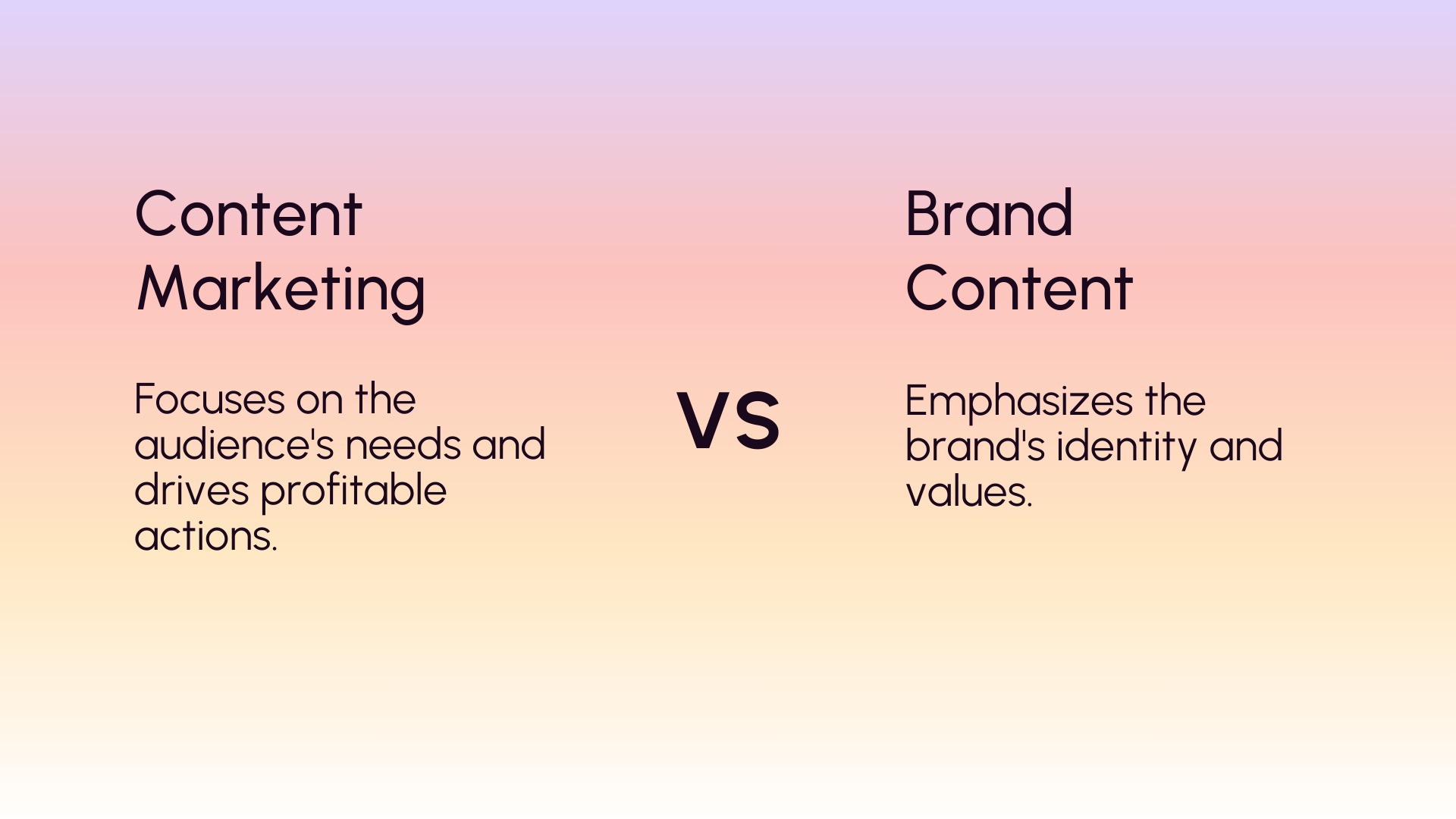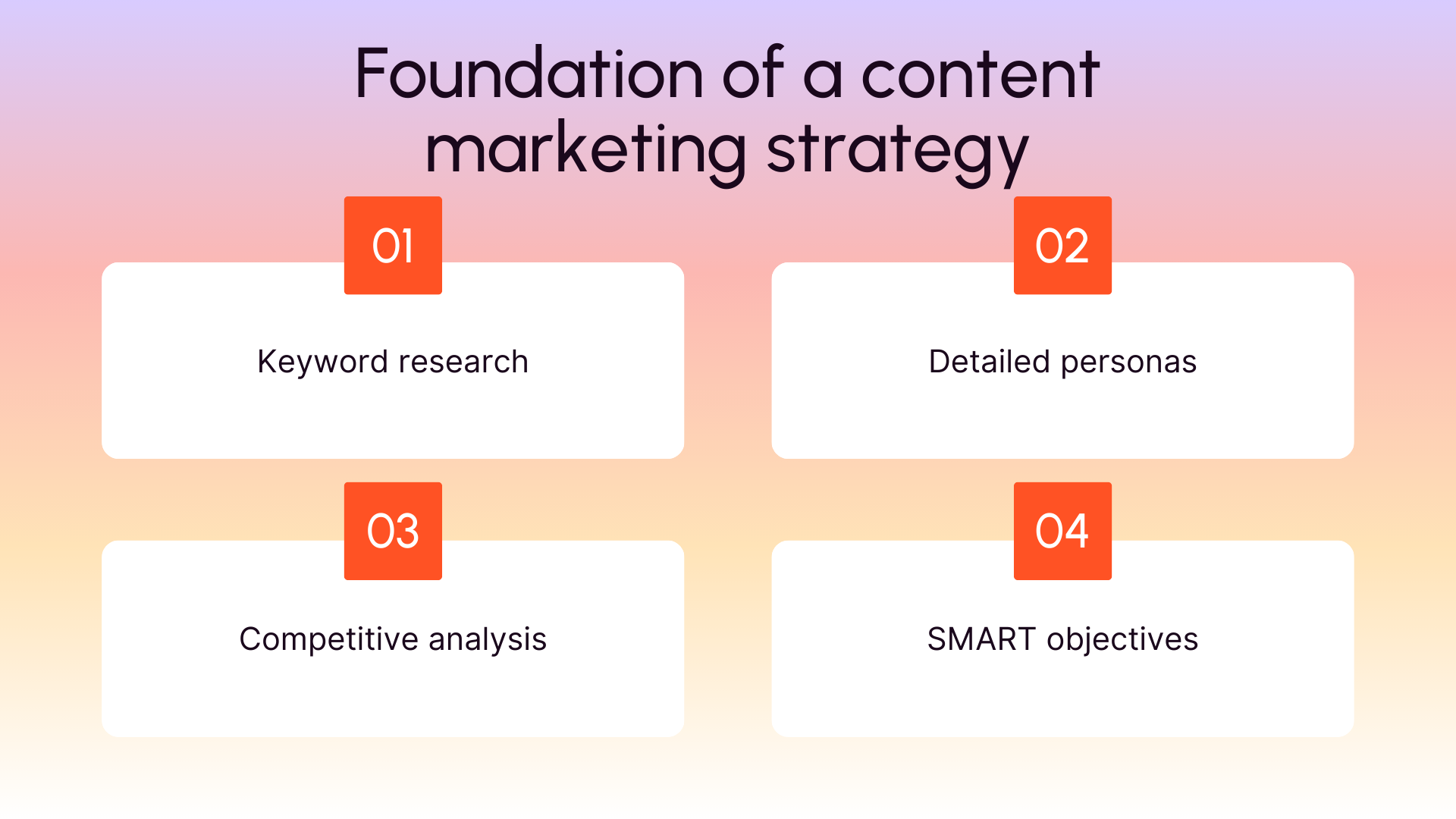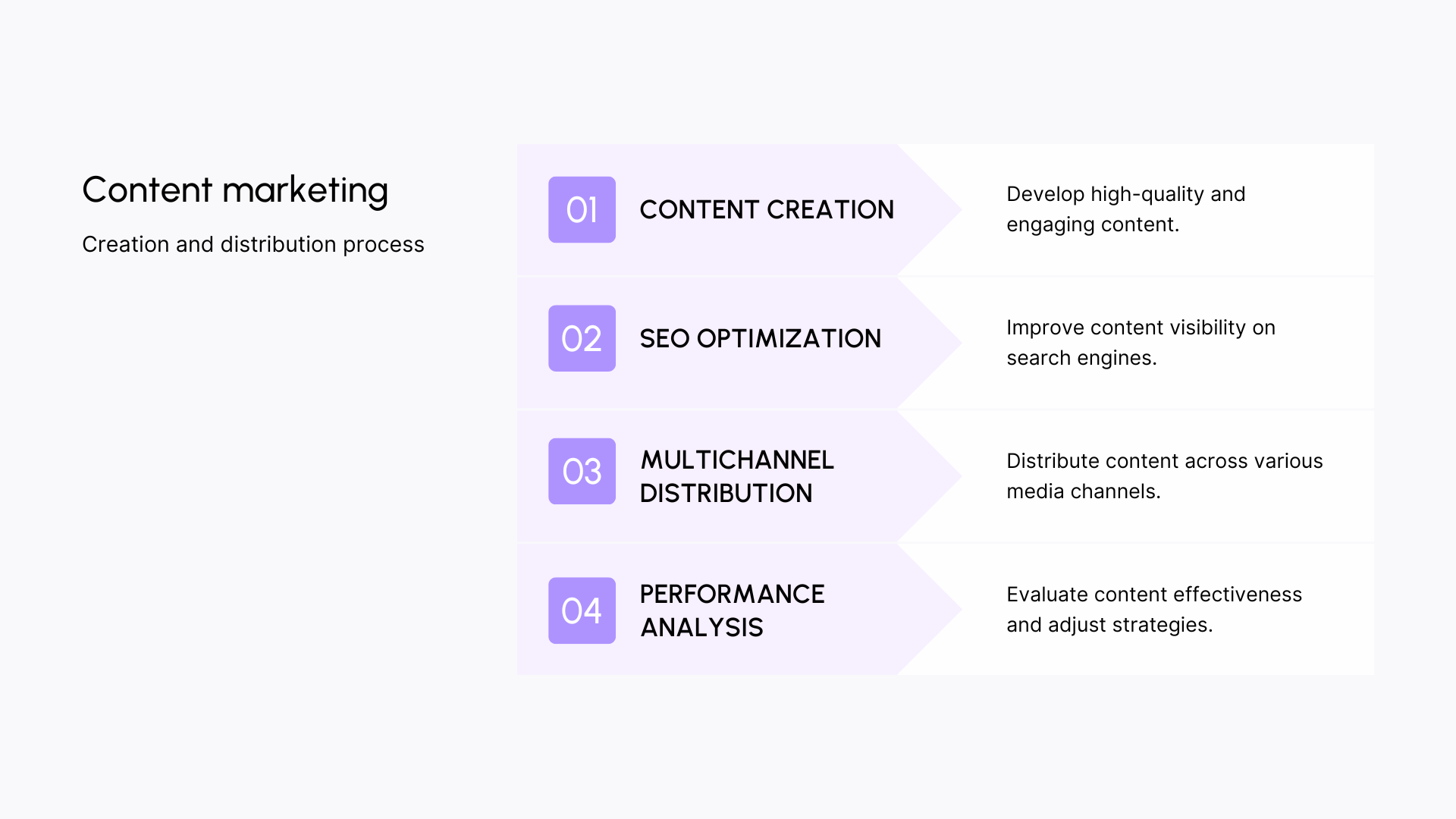Content marketing: A complete guide to a successful strategy
In a digital environment increasingly competitive, a question arises: how to attract qualified visitors to your website, convert them into leads and increase the transformation rate of your sales teams?
The answer is simple: by deploying a content marketing strategy effective and adapted to current challenges. This article provides you with a comprehensive guide to understanding, developing, and optimizing your content marketing strategy. Whether you are a beginner or want to perfect your approach, here you will find all the keys to making content a real driver of growth for your business.
Key points to remember
- Sharing your expertise does not weaken you, it positions you as an essential referent in the eyes of your prospects (and Google).
- Your competitors won't learn anything they don't already know, but your prospects will remember your ability to create value.
- Content marketing is not just an inbound tactic : it is a philosophy that is useful for all your marketing actions, including SEO and prospecting.
- The key to success, it's not about saying everything or keeping everything, it's about structuring relevant, regular and quality content to support your prospects at the right time.
What is content marketing? Definition and key concepts
Definition of content marketing
The Content marketing, or content marketing, is a strategic approach focused on creating and distributing relevant, useful, and consistent content to attract and retain a clearly defined audience, with the ultimate objective of generate profitable customer actions.
Contrary to Brand content, which focuses on the identity and values of your brand, content marketing focuses on the needs, questions and problems of your audience. Your content Talk about your prospects and not about you — that is all its strength.
Today, content marketing has emerged as a essential pillar B2B and B2C marketing strategies. It has evolved to adapt to new consumer expectations: more demanding, more informed and less receptive to traditional commercial approaches.

The evolution of content marketing: from the Michelin Guide to content hubs
Content marketing is not a recent invention. One of its most iconic examples dates from 1900 with the Michelin guide. The tire brand created this guide for the rare car owners of the time, offering a list of garage owners and good addresses across France. Without ever directly mentioning tires, Michelin subtly encouraged readers to take to the road... and therefore to wear out their tires!
This pioneering approach Illustrates perfectly The essence of content marketing : bring real value to the audience While indirectly serving commercial purposes of the company.
Today, content marketing has grown in sophistication and diversity, but its fundamental principles remain the same: inform, educate, solve problems and build a relationship of trust with your audience.
What is the main purpose of marketing content?
Impact on the acquisition of qualified traffic
The content marketing has established itself as one of most effective strategies to generate qualified traffic to your website. Contrary to traditional advertising approaches, which can attract significant but low-qualified traffic, content marketing precisely targets people interested in your field of expertise.
According to a recent study, companies that invest in content marketing generate on average 3 times more leads than those that favor traditional advertising methods.
This efficiency is explained in particular by the perfect alignment between the contents what you offer and the search intention of your prospects. By answering their questions precisely, you naturally attract the people who are most likely to be interested in your solutions.
Role in qualifying and educating prospects
The Content marketing plays a crucial role in qualification and educating your prospects, especially in long sales cycles characteristics of B2B.
Thanks to a lead nurturing strategy powered by quality content, you can:
- Maintaining commitment prospects throughout the buying cycle
- Helping them better understand their problems and the solutions available
- Strengthen your credibility and your expertise
- Facilitate their internal decision-making process
A prospect who is nourished by relevant content throughout their buying journey will not only be better qualified, but also more likely to choose you as a partner when they are ready to buy.
Influence on the commercial conversion rate
The impact of Content marketing is not limited to The acquisition And at the qualification : it also significantly boosts your commercial conversion rates.
Studies show that prospects exposed to coherent content marketing strategy Convert to average 6 times more than the others. Why? Because your content:
- Builds trust towards your brand
- Concretely demonstrate your expertise
- Responds to objections even before they are formulated
- Provides arguments that your prospects can use internally to justify their choice
Your sales team thus benefits from a much more favorable context, with prospects who are already convinced of your added value.
Methodology: How to create an effective content marketing strategy
Prerequisites
Setting SMART goals
Toute effective content marketing strategy starts with the definition ofSMART goals (Specific, Measurable, Achievable, Realistic, and Time-Defined). Examples:
- Increase organic traffic by 30% in 6 months
- Generate 60 qualified leads per month via downloadable content
- Reduce customer acquisition costs by 20% over the year
Competitive analysis and benchmark
Before you start, Analyze what your competitors are doing And the leaders in your sector :
- Which types of content do they produce?
- On which channels are they present?
- Which Do they cover topics (and which ones do they overlook)?
- Which formats seem to generate the most engagement?
This analysis will allow you to identify opportunities and to refine your positioning.
Creating detailed personas
La thorough understanding of your audience is the key to a successful content strategy. Yours personas should include:
- Demographic and professional information
- Professional goals and challenges
- Information search and purchase process
- Decision criteria
- Common questions at every stage of the buying journey
Keyword research and intent mapping
THEkeyword analysis remains fundamental, but it has evolved considerably. Today, the important thing is to understand the intent behind each search :
- Informational intent (information search)
- Navigational intent (search for a specific site)
- Transactional intent (purchase intent)
- Commercial intent (comparison of options)
Map your content based on these intentions and the Stadium of customer journey corresponding.

Creation and distribution process
Development of an editorial calendar
One structured editorial calendar will allow you to maintaining regular and consistent production. It should include:
- The themes to be addressed
- Content formats
- Targeted keywords
- Distribution channels
- The dates of publication
- Those responsible for each content
Plan a balance between evergreen content and current content to maximize the impact of your strategy.
Content creation process
Establish a clear process for creating content:
- Research : data, sources, examples
- Editorial or production
- Edition and SEO optimization
- Validation (technical, legal if necessary)
- Publication and initial promotion
- Analysis Performances
- Update regular
This process guarantees the quality and consistency of your content, while optimizing the use of your resources.
Integrate SEO into your content strategy
The SEO is inseparable from a good content strategy. Working on your SEO means maximizing the visibility of content on search engines and boosting qualified traffic.
- Write to be visible: In content marketing, each content must be optimized for a relevant keyword: long tail, title tags (H1, H2...), URL, “alt” image attributes... Everything counts. Good upfront research on keyword competition is also essential to position yourself effectively.
- Attracting connections naturally: Backlinks remain a key driver for Google. Useful, well-thought-out, and well-written content naturally attracts inbound links from other sites or influencers, further improving SEO.
Multi-channel delivery strategy
Creating content is good. Disseminating it effectively is better. Activate all your channels:
- Owned media : blog, website, newsletter
- Earned media : press, organic shares
- Paid media : social ads, native ads
- Shared media : social networks, communities
In B2B, LinkedIn remains the key channel. But there are other options that are worth considering:
- X : for monitoring and relationships
- Pinterest : still under-exploited in B2B, excellent for SEO
- instagram or other specialized platforms according to your sector
First, focus on the networks your audience uses.

And then? Convert and retain with inbound marketing
You have produced and distributed your content, traffic is increasing... but the leads are not following?
It is here that inbound marketing enter the scene.
THEInbound marketing, more global than content marketing, uses content as the main lever, but also integrates other tools (SEO, marketing automation, lead nurturing...) to support the prospect at each stage of their buying journey, until they retain their loyalty.
In summary: content marketing is The fuel, inbound is The engine. One does not go without the other: to perform, your marketing strategy must combine quality content and intelligent orchestration of the customer journey.
💡 Thus, by analyzing the content consulted by your visitors, you can estimate their level of maturity... and offer them the right message at the right time, thanks to tools of Marketing automation. This is what turns a content strategy into conversion motor.
Content types for effective content marketing
Diversifying formats has become essential to effectively reach your audience through different channels and consumer preferences. Together, we discover the most effective types of content.
SEO optimized blog posts
Despite the emergence of new formats, the blog posts Remain one Pillar of content marketing. However, they have evolved to respond to new expectations readers and search engines:
- Deeper articles in the background, but not always longer in shape
- Optimized structure to answer specific questions (FAQ format)
- Integrated interactive content (calculators, quizzes, etc.)
- Optimization for voice search and featured snippets
- Regular updating of existing content
Blog posts are also a great base to fuel your SEO strategy, with Google always prioritizing written content to understand and index your site.
Podcasts and audio content
The audio format Has experienced a explosive growth in recent years, and this trend is continuing. The podcast offers several advantages:
- One intimate format that promotes engagement
- La ability to consume content while multitasking
- One networking opportunity with expert guests
- A format easily adaptable in articles, videos, infographics
Companies like HubSpot, with its podcast “The Growth Show”, fully understood the potential of this format to position their brand as a thought leader.
Videos (short and long)
Youtube remains the world's second largest search engine, and the video continues to dominate engagement on social networks. Two trends coexist:
- Les short videos (less than 3 minutes) for social networks and initial awareness
- Les long formats (webinars, detailed tutorials) for in-depth education and conversion
The democratization of video creation tools now allows any company to produce professional quality content without a significant budget.
Newsletters and email marketing
La Newsletter Knows a Major revival over the last few years. She established herself as a Preferred channel to maintain a direct relationship with your audience, without depending on social media algorithms or search engines.
Thematic, personalized and high added value newsletters allow you to retain your audience while gradually qualifying your prospects.
Content hubs and resource centers
Les Content Hubs — these centralized platforms grouping all of your resources on a specific theme — have become essential for companies wishing to establish themselves as leaders in their market.
These spaces organized by themes and by levels of expertise allow your visitors to intuitively navigate through your content and gradually deepen their knowledge of your area of expertise.
Other examples exist: customer testimonials, case studies, etc... that have no shortage of impact in a good content marketing strategy!
Inspiring B2B content marketing examples
Salesforce: a complete content ecosystem
Salesforce has developed a real content ecosystem including:
- The Trailhead platform for interactive learning
- The Salesforce Blog with articles targeted by sector and function
- Regular webinars and virtual events
- In-depth research reports on the state of the market
This multi-format approach allows them to reach different audience segments and to support their prospects throughout the sales cycle, which is particularly long in their sector.
Ahrefs: content marketing at the service of education
La Ahrefs SEO platform has built its reputation thanks to an exemplary content marketing strategy:
- High-quality blog posts on SEO
- An educational YouTube channel with over 300,000 subscribers
- Exclusive data studies
- A free Academy to learn the basics of SEO
This strategy not only allows them to attract qualified traffic, but also to train their potential users, thus reducing the obstacles to the adoption of their tool.
Cougnaud Construction: sectoral expertise put forward
The modular building manufacturer Cougnaud Construction has developed a quarterly magazine specializing in industrialized construction. This publication combines:
- In-depth articles on innovations in the sector
- Customer testimonials
- Market trend analyses
- Practical cases illustrating the company's expertise
This format allows Cougnaud to position itself as a true sector expert and not as a simple supplier.
Shine: targeted content for freelancers
La Shine Neobank offers information sheets on its blog that are perfectly adapted to its main target: freelance entrepreneurs. There you will find:
- Administrative and fiscal guides
- Inspiring testimonies
- An income simulator
- Podcasts with successful entrepreneurs
This ultra-targeted approach allows Shine to differentiate itself in a very competitive banking sector.
The Content marketing Is not a Passenger fashion, but a profound transformation of the way businesses communicate with their market. It has established itself as a essential pillar Of all effective marketing strategy.
And it continues to evolve, especially with artificial intelligence, which is disrupting practices with concrete uses :
- Help with content generation
- Large-scale customization
- Predictive performance analysis
- Automated SEO optimization
AI is not replacing content creators, but amplifying. Businesses that integrate it intelligently gain productivity, relevance and agility.
If you are just starting out, Start small but seriously : a regular blog, an active presence on LinkedIn and a monthly newsletter already form a solid foundation. Over time, gradually diversify your formats and channels based on the results obtained. The Content marketing is an investment that, well executed, will pay off for years to come. So where do you start? What if we talked about it?












